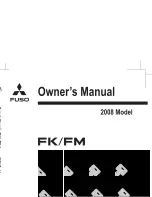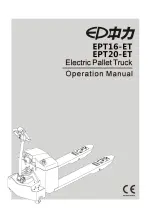
violently is forbidden.
2. Start in winter
When it is very cold, referring to the
following measures to start engine.
荫
Use hot water to take the place of
cooling water, turn on the drainage
switch when heating the water. When
the hot water flow out and the engine
body become warm, close the
drainage switch.
荫
Heat up the oil up to 80
益耀
90
益
,
and then add it into the oil pan.
After starting the engine, check the
operating state of the engine and
instruments at different rotating
speed. Especially check the oil
pressure. Check whether there is
leakage of water
尧
oil and gas,
whether the oil level is normal and
whether there is noise coming from
the engine as well as checking
whether the color of exhaust is
normal.
3. After starting the engine, do not
press the accelerator pedal violently,
loosen the accelerator pedal to keep
the engine operating on idle for some
time. After the temperature of engine
rising and the engine operates
stably, uplift the clutch pedal slowly.
4. Usually run the vehicle after the
temperature of engine rising to 60
益
and the operating (sound) of the
engine
and
the
reading
of
instruments are normal. Do not run
the vehicle in low temperature to
avoid wearing the engine.
Starting and shifting of the vehicle
After engine operates normally, press
the clutch pedal, shift into low gear,
loosen the parking brake, and press
the horn once. Make sure that the
vehicle can be operated safely,
loosen the clutch pedal slowly and
depress
the
accelerator
pedal
properly at the same time to start the
vehicle. After starting the vehicle, the
foot should be went away from the
16
OWNER
爷
S MANUAL for
HFC1061,HFC1063,HFC1083
series trucks
17
clutch pedal. Do not keep the foot on
the pedal to avoid the burning out of
the clutch friction disc.
When shifting, do not just see the
shifting rod .You should watch
forward and hold the steering wheel
steadily with your left hand, having
the hollow of the palm of your right
hand stick to the top of the shifting
rod and push or pull it to the right
position with your right wrist.
Running, swerving, turnaround, bac -
king and braking of the vehicle
1. Running:
Keep enough distance to the
foregoing vehicle when running on
flat road. Select vehicle speed
according to the vehicle model,
mission and concrete condition of
road, generally select the speed of
50-70km/h.
Let the vehicle run in the first or
second
gear
when
starting,
upgrading under heavy load and
running on bumpy road or on the
road with obstacles. But the vehicle
cannot be run in the first or second
gear too long. When upgrading with
heavy load, shift the shifting rod into
low gear to avoid overloading of the
Note:
Do not let the vehicle run in
the first or the second gear for a
long time to prevent from increasing
the
wearing
and
the
fuel
consumption. Loosen the clutch
pedal rapidly or depress the
accelerator pedal insufficiently, the
engine can stop.
When running the vehicle, shift the
gear according to the change of
road and landform. If finding the
engine power abundant and the
rotating speed rises, it illustrates
that the primary gear is not
appropriate, the vehicle should be
shifted to the next fast gear in time.
After shifting, if not finding shortage
of power and
chattering of trans-
mission, the shifting operation can
be considered right. For safety,
when swerving, passing bridge
and meeting, the vehicle can run
in moderate speed. If the running
condition is better, the vehicle can
run in high speed so as to make
the speed higher and economize
the fuel.







































